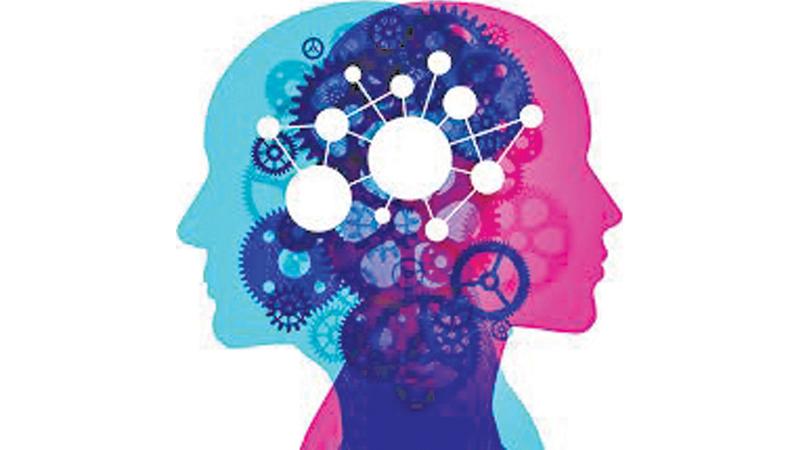

Following reports of rising statistics of mentally ill persons worldwide including Sri Lanka on World Mental Health Day observed last week, and the Health Ministry’s emphasis on mental well-being, the Sunday Observer asked eminent psychiatrist and founder member of the National Mental Institute of Health Dr Jayan Mendis his views on this emerging problem.
Excerpts
Q.The pledge to prioritise mental health has brought mental well-being to the forefront. How do you define mental well- being?
A. For some, it may mean happiness or contentment and for others it may be the absence of disease. The World Health Organization describes mental well-being as a state of well-being where the individual realises his or her own abilities, can cope with the normal stresses of life, can work productively and fruitfully, and is able to make a contribution to his or her community.
Q. It has been said that 1 in 3 Lankans suffer from some form of mental illness. Do you agree?
A. Yes, the statistics may be higher as there can be more people who do not come for treatment due to various reasons like reduced awareness regarding mental health problems, social stigma, poor family support and not having easy access to mental health services in the peripheral areas of the country.
Q. Mental experts here and abroad have observed that the mental well-being of many persons irrespective of religion and race was severely undermined due to the mental stress caused by the novel Covid- 19 pandemic. Your comments?
 Dr Jayan Mendis |
A. Fear, stress and worry are normal responses to a serious pandemic like the Covid-19. Adding to the fear of contracting the virus, there were several other issues and significant changes to people’s lives due to restrictions to movements following the lockdown that caused a great deal of stress.
Q. Do you see mental stress in Lankans as an emerging problem in the country? Who are most vulnerable to develop mental stress- age wise, gender wise and occupation wise? Why?
A. Ages 18 to 33 and 34 to 47 report the highest average stress levels. Gender wise, women are more likely to report increased stress levels compared with men.
Increasing responsibilities to manage households as well as jobs and taking care of families fall on women most of the time with less support from their spouse. Social expectations and specific stressful life events such as child birth, miscarriages and adverse events in marriage like gender based violence and abuse can add more stress to a woman’s life.
Occupations related to Security Forces, fire-fighters, airline pilots are some of the most stressful occupations worldwide. In addition, healthcare workers also undergo a significant amount of stress, especially during a pandemic like the Covid-19.
Q. General symptoms of those suffering from mental stress?
A. • Dizziness or a general feeling of ‘being out of it.’
• General aches and pains.
• Grinding teeth, clenched jaw.
• Headaches.
• Indigestion or acid reflux symptoms.
• Increase in or loss of appetite.
• Muscle tension in neck, face or shoulders.
• Problems sleeping.
• Racing heart.
• Cold and sweaty palms.
• Tiredness, exhaustion.
• Trembling/shaking.
• Weight gain or loss.
• Upset stomach, diarrhoea
• Sexual difficulty.
Q. What are the other most common mental illnesses in Sri Lanka?
A. The most common mental illness is depression (37%), followed by psychosis (17%). A greater number of females has depressive disorders, anxiety disorders, and psychosis. Sri Lanka is also a country with a high suicidal rate, about 15 per 100,000.
Q. Signs to look for in a person with mental illness?
There are specific signs for each mental illness, but some of the common signs can be,
• Excessive worrying or fear
• Feeling excessively sad or low
• Confused thinking or problems concentrating and learning
• Extreme mood changes, including uncontrollable ‘highs’ or feelings of euphoria
• Prolonged or strong feelings of irritability or anger
• Avoiding friends and social activities
• Difficulty in understanding or relating to other people
• Changes in sleeping habits or feeling tired and low energy
• Changes in eating habits such as increased hunger or lack of appetite
• Changes in sex drive
• Difficulty perceiving reality (delusions or hallucinations, in which a person experiences and senses things that don't exist in objective reality)
• Inability to perceive changes in one’s own feelings, behaviour or personality (lack of insight or anosognosia)
• Overuse of substances like alcohol or drugs
• Multiple physical ailments without obvious causes (such as headache, stomach ache, vague and ongoing aches and pains)
• Thinking about suicide
• Inability to carry out daily activities or handle daily problems and stress
• An intense fear of weight gain or concern with appearance
Q. How early can they be detected?
A. Changes in personality can be detected within several weeks by the patient’s family and friends. There are some mental illnesses that show early signs in childhood and adolescence as well.
Q. What causes symptoms at such an early age?
A. Causes for mental illness can be variable and complex. Genetic factors play a role in depression and certain personality types with high levels of anxiety can predispose to depression. Parental deprivation, poor relationship with parents, recent stressful life events like relationship break-ups, exam failures can also lead to depression. Change of levels of chemicals in the brain called neurotransmitters which include reduction of serotonin and noradrenaline is also a major cause for depression. Both family history and environmental factors like early adverse events e.g. abuse can predispose to bipolar mood disorders. Schizophrenia which is a major psychotic disorder is linked with strong family history, early cannabis use, increased activity of Dopamine neurotransmitter in the brain, life difficulties and childhood trauma. Anxiety disorders are associated with stressful life events.
Q. Other causative factors for mental illness- is depression one of them?
A. When long-lasting and with moderate or severe intensity, depression can become a serious health condition. It can cause the affected person to suffer greatly and function poorly at work, at school and in the family. At its worst, depression can lead to suicide
Q. Diet?
A. Many recent studies have shown that diet and lifestyle have an effect on mental health. Studies comparing ‘traditional’ diets, like the Mediterranean diet and the traditional Japanese diet, to a typical Western diet have shown that the risk of depression is 25% to 35% lower in those who eat a traditional diet. The main difference between these diets is that traditional diets tend to be high in vegetables, fruits, unprocessed grains, and fish and seafood, and contain only modest amounts of lean meats and dairy. They are also void of processed and refined foods and sugars, which are staples of the Western dietary pattern. Healthy lifestyle patterns that include more frequent physical activity, non-smoking and regular social rhythm have a positive impact on mental health.
Q. Obesity, lack of exercise, do they play a role?
A. Obesity is closely linked to depression, anxiety disorders, neurodegenerative diseases and sleep disorders. Obese people feel rejected, unattractive, or suffer social discrimination and the emotional strain may cause further weight gain as they tend to console themselves with ‘comfort food,’ which is usually high in fat, sugar, and calories. There is also a characteristic type of depression with symptoms that include lethargy and overeating. There is evidence to show that not getting enough physical activity can lead to mental illnesses like depression and dementia.
Q. Can young children develop mental illness due to school bullying, being overweight, pressure to perform well academically? What are the symptoms?
A. Children can also develop depression, anxiety and stress disorders due to these reasons. Symptoms can be:
• sadness, or a low mood that does not go away
• irritable or grumpy all the time
• not interested in things they used to enjoy
• feeling tired and exhausted most of the time
• have trouble sleeping or sleep more than usual
• unable to concentrate
• interact less with friends and family
• less confidence
• eat less than usual or overeat
• big changes in weight
• seem unable to relax or be more lethargic than usual
• talk about feeling guilty or worthless
• feel empty or unable to feel emotions (numb)
• have thoughts about suicide or self-harming
• self-harm, for example, cutting their skin or taking an overdose
Q. Treatment- how are mental illnesses treated?
A. The patient’s history of illness, symptoms, mental state examination and investigation findings all lead us to a diagnosis or differential diagnosis which is helpful in deciding the treatment options.
But treatment is custom tailored for each individual according to their needs and circumstances. For example, not every patient with psychiatric disease needs hospital admission. The decision to admit the patient may vary according to the severity of the episode, risk to self and others and social support system of the patient.
Q You were a founding member of the National Institute of Mental Health (NIMH). Compared to its inception what new services does this Institute offer to mentally ill patients today?
A. In the 1920s it was known as the Angoda Asylum, and at that time it was overcrowded and the atmosphere was similar to a prison with high walls and wooden bars, which enclosed the corridors leading to the wards.
Today the hospital has been transformed into a respectable place and provides both outpatient and inpatient facilities including special units such as Gender-Based Violence Unit, Geriatric Psychiatric Unit, Perinatal Psychiatric Unit, Learning Disability Unit, Forensic Psychiatry Unit, Occupational Therapy Unit and Alcohol Rehabilitation Program, to highlight some of the specialised services provided by the NIMH.
Q. What steps have been taken by the Health Ministry to prevent mental illness?
A. A national mental health policy was approved by the Cabinet in 2005. The vision of the Mental Health Policy of the Ministry of Healthcare and Nutrition, is the establishment of an affordable, accessible, comprehensive, community-based service that will promote the mental well-being of the community. There’s a separate Directorate of Mental Health in the Health Ministry that undertakes the responsibilities of organising mental health services.
Q. With a rising aging population it is likely that mental diseases will also see an upward spike in the future. Your comments?
A. Older people may experience reduced mobility, chronic pain, frailty or other health problems as well as bereavement, a drop in socioeconomic status and isolation.
These risk factors may lead to mental illnesses such as depression, anxiety disorders and dementia in an ageing population.
Q. Have you any golden rules regarding mental well-being for our readers?
A. Make it a priority to take care of your mind. Talk about your feelings, listen and be there for friends and family. Seek help when you need it. Have a balanced and healthy lifestyle.
